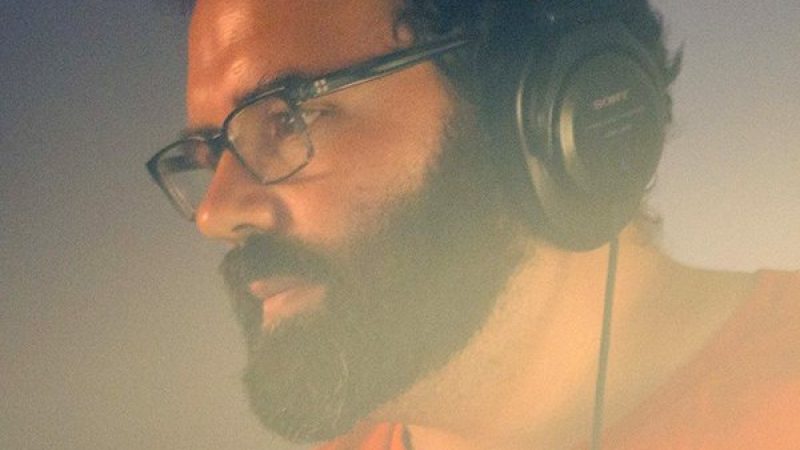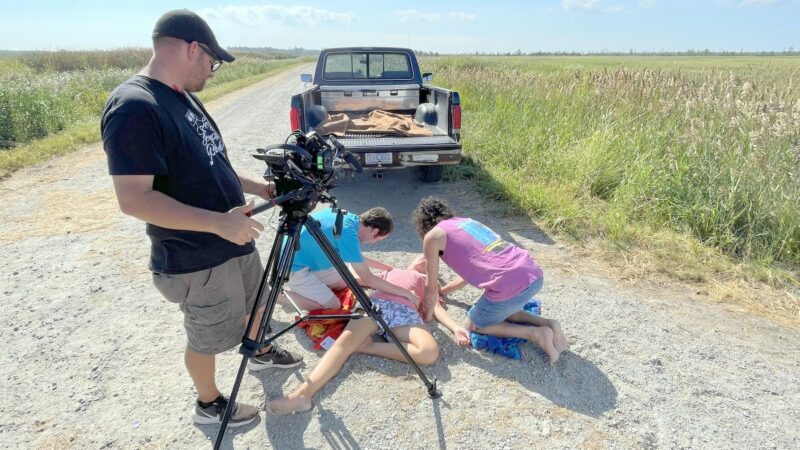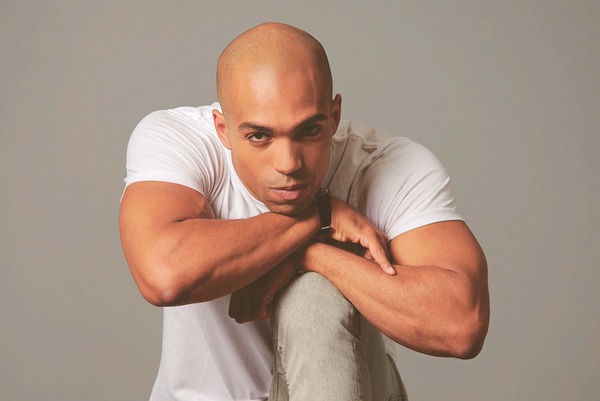
I was mesmerized by Star Wars as a kid growing up in the suburbs of Chicago. The characters and world completely captured my imagination: I wanted to be a Jedi! How could this story not be real? Because it moved me so deeply. When I was in sixth grade I adapted Return of the Jedi into a stage play. I was the director and cast myself as Darth Vader. We rehearsed on the playground at recess and I decided to film it in the basement of my friend Nick Russell on Martin Luther King Day. Because no one showed up on time and I was such a perfectionist, we only got as far as Yoda’s death. But I caught the acting bug and then started doing plays in high school. I was bullied as a kid for being different and the theater became a home to me. Here my sensitivity and creativity were welcomed as gifts rather than treated as personal flaws.
“My Return Address is You” w/ Shanica Knowles @iamShanica now available on @iTunes, @AppleMusic and @Spotify. Listen today! #NewMusicFriday pic.twitter.com/JH8UHCF0xV
— Adam Davenport (@dported) January 27, 2017
How did you become an actor?
I dreamt of acting for a long time but it took years before I had the confidence to pursue it as a career. My first professional experience with acting was through directing actors and observing how they work. I studied film at Yale and for my thesis film Midnight Son I cast an ensemble of actors I loved, including Melissa Leo and David Harbour, a Tony-nominated actor who impressed me so much in Anthony Page’s Broadway revival of Who’s Afraid of Virginia Woolf?
I became close with Melissa and David; they later were both my roommates in Los Angeles and we would put together informal readings of classic plays in our living room, everything from Chekhov to Tennessee Williams. These readings connected me with so many great actors, including Alfre Woodard and Sally Kirkland, both of whom have since become mentors to me. Melissa became a mother of sorts to me and I would travel with her on set and she’d ask me to run lines with her. One day she made an offhanded comment that if I wanted to, I could work as an actor. She recognized a natural ability in me. No one had ever really given me that kind of validation before, and here was someone whose work I regarded so highly giving me permission to go for my dream.
There is nothing greater than the power of belief. I realized that if I ultimately wanted to become an actor’s director I should start working as an actor to have that understanding of the craft that can only be acquired by doing it. So I packed two suitcases and moved from Los Angeles to New York City, renting a cheap room in Brooklyn from a friend. I paid a photographer for headshots and looked for representation. It was a leap of faith in myself as I had no formal acting training outside of studying improv at Groundlings and a few things Melissa had taught me privately.
A New York manager Mike Lyons started submitting me for roles and my very first appointment was reading for five-time Tony Award winner Susan Stroman and Colman Domingo at the Vineyard Theatre; a dozen auditions later, I was cast in the chorus of a new opera, Michael Bergmann’s adaptation of Bonfire of the Vanities, staged at the old Heckscher Theater where Joseph Papp originally mounted his New York Shakespeare Festival. One gig led to the next and in my first year of living of New York City I became a working actor able to support myself from my wages as a performer.
What acting technique do you use?
I don’t think I’m ever just using any one individual technique: the way I work incorporates everything I’ve studied, from Stanislavsky to Alexander Technique, which has helped me remove tension from my body. But as I am starting to work more, I find that I am using my imagination more. But there is not a singular way to get to the truth: whatever gets you there is valid
What wrong impressions do actors hold about acting?
I hate when people say that they might be a good actor because they are a good liar! Acting is about telling the truth.
Do you take courses to improve your craft?
I first started studying privately with Milton Justice, who is a disciple of Stella Adler. I’m currently studying with Gregory Berger-Sobeck; he teaches the on-camera film acting curriculum at Yale School of Drama; his technique draws a lot from Earl Gister, who taught everyone from Meryl Streep to Frances McDormand. Milton taught me so much about the necessity of script analysis and drawing as much information as possible about the character from the script; Berg taught me how to access my imagination more.
What acting books do you read?
I read whatever inspires me so I usually read plays on my subway commute: I think it’s important for actors to have an appreciation for great writing; a good script is an actor’s best friend. But as far as acting texts, I used to carry Ivana Chubbuck’s The Power of the Actor with me to every audition. Now I like reading individual actor memoirs: I find personal accounts of their journeys to be inspiring and spiritually nourishing. I can just re-read a few pages for self-affirmation to keep going on a trying day. Melissa Leo gave me her copy of Ellen Burstyn’s Lessons in Becoming Myself, and Louis Zorich gave me a copy of his memoirs Beating the Odds after his wife Olympia Dukakis directed me in a reading. Next on my reading list is Michael Schulman’s Her Again: Becoming Meryl Streep.
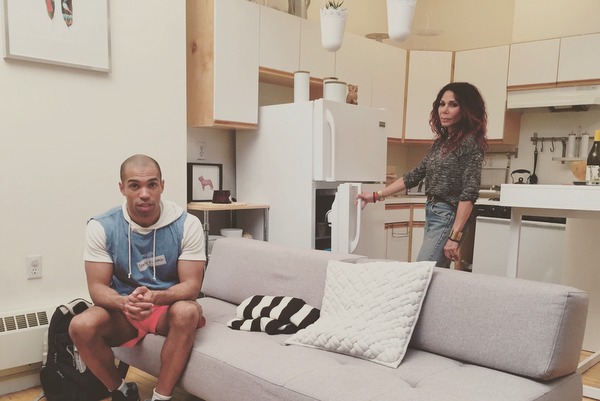
Adam Davenport in Conversion with Daphne Rubin Vega
How do you keep fit as an actor?
Three things keep me healthy: fitness, nutrition and spirituality. The gym is a regular part of my routine; so much of acting is about being available in your body. People know me now as this fit guy but I wasn’t born with that body; for most of my life I was 150 pounds and super thin so the muscle is something I’ve built over the last three years. I’m now 185 pounds and largely just maintaining that. Diet is also so key; my friends tease me for frequenting Whole Foods so often but my overall mood is entirely impacted by what I eat. If I eat crap, I’ll feel like crap and less likely to do decent work. And last but not least, I have a spiritual practice to maintain a relationship with myself and God. If my mind is not right, everything else in my life comes apart. I consider myself a Christian and have also recently started studying Buddhism. So I do what I need to do to keep my energy positive
How do you prepare for a role?
I read the script over and over again, searching for clues. It’s a process of discovery that allows me to learn as much as possible about myself as the character. Who am I? What do others say about me? I then start to create a backstory and access my imagination to fill in the gaps between myself in real life and myself as the character. Then I start to work on the words and learn them as thoughts.
How do you stay fresh on set
I try to be active and focus on what I am doing in the scene. Each take is an opportunity to discover and delve deeper.
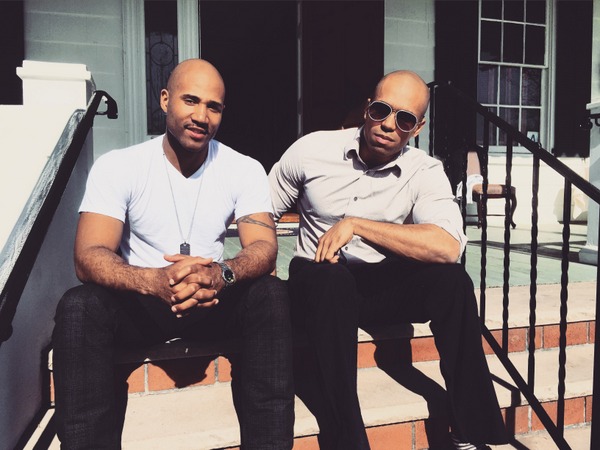
Adam Davenport in Deadline: Crime with Tamron Hall
Describe a memorable character you played
I played Hercules! It was my first feature, PROJECT OLYMPUS, an indie movie musical with the Greek gods in outer space. The director Alex Ewen has completed re imagined Greek mythology in this film and he likens it to Pink Floyd’s DARK SIDE OF THE MOON; everything is sung like a rock opera. We filmed the entire movie on a green screen. For the audition, I initially sent in a self-tape. The casting director Eve Pomerance then asked me to come in and sing for the director Alex Ewen. It’s one of those auditions where you just come in, do it and leave, and mentally move onto the next thing on your plate. I remember feeling confident but having no idea what they thought of me in the room. They offered it to me a few weeks later. Eve later told me that five hundred actors had auditioned for the same role, wow. With me in the role, I’d describe it as a quirky supporting part. Hercules is leading a group of demi-gods into battle; he’s seen the ugliness of war and understands that he is leading lives to death. He is aloof and wary of relationships with others; he for instance mistrusts Athena although she makes it no secret that she is attracted to him. He’s certainly stoic as one would expect but Alex and I thought to make him more human that there’s shades of uncertainty underneath. A little vulnerability is always more compelling; it makes a hero more relatable to the audience and a departure from the archetypes of this character we’ve seen before.
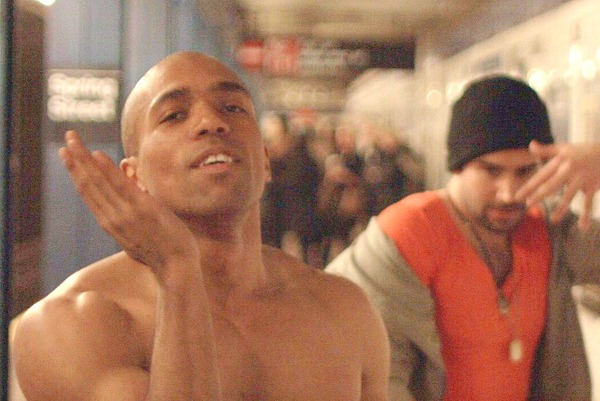
Adam Davenport in Conversion with Stephen Dexter
Explain one creative choice you took on set
Colombian filmmaker Esteban Uribe cast me as a transgender sex-worker in Cleanse Pest, Rest. After the make-up test, I took the subway to the director’s apartment in complete costume for our rehearsal. I wanted an opportunity to walk and breathe as her in the real world. I made so many people uncomfortable. People stared; others turned away in disgust. I went to a deli to order some dinner, and I could tell that they did not want to serve me. I understood then the danger of living openly as a transgender person in America. I’m very proud to be a small part of Esteban’s film; it made its World Premiere at the Budapest Short Film Festival, where it was selected from more than a thousand submissions.
What do you want most from a director
I love this question, as directing is also a long-term career interest of mine. As an actor for hire I’ve worked with dozens of directors, all levels of experience and competency, and I would have to say i prefer working with someone who can clearly communicate what they want, while at the same time providing an environment where we the actors have freedom to create and permission to do our best work. We’re all here working together to serve the story, and it’s not very helpful if the captain of the ship doesn’t know how to articulate what they’re asking of you in the storytelling. Because then you’re shooting in the dark and have to figure it all out by yourself. I prefer collaboration.
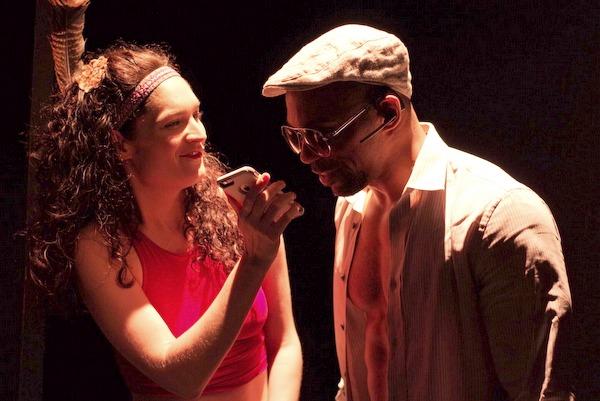
Adam Davenport in Last of the Caucasians at the Barrow Group Theater
What actors do you long to work with
Oh, I wish they could bring Geraldine Page back from the dead! But otherwise, I’d say maybe Robert Downey, Jr.
Why
I love how mercurial and unpredictable he is. I met him on set of The Judge. I was in Melissa’s trailer and he came inside to talk to her. He pays attention to everything and noticed that I was reading Nic Sheff’s memoir Tweak. “Why are you reading that book?” Turns out he had read it when he first became sober and it’s one of his favorite books. On set, he went out of his way to check in with me to see where I was in the reading and his memory of all the details was uncanny to me. He remembered everything, as if he had been reading over my shoulder. Maybe we should collaborate on the film adaptation of Tweak, who knows?!
What advice would you give to actors
Commit to yourself and the craft. It is a journey: indulge in the process and the results will come. The more time and energy you devote, the more you will grow. It is okay to fail: I’ve learned more from making mistakes than from “getting it right.” Sometimes an accident can lead to a breakthrough. Be open: every experience can teach us something new.
Briefly write about your career
I want to be a character actor. The range of characters I’ve played over the last two years in New York has forced me to examine different parts of myself: a hot-tempered commodities broker who loves cocaine, a transgender prostitute who becomes a victim of a hate crime, an immigrant from Trinidad who manipulates women sexually to advance himself, a wealthy eccentric who struggles to find balance between travel for work and his own sanity.
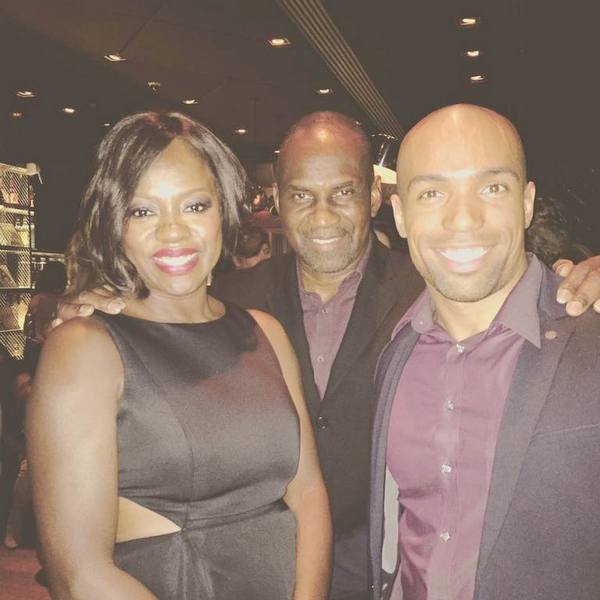
Adam Davenport, Viola Davis and Julius Tennon at the Tribeca Film Festival after party for the world premiere of CUSTODY on April 17, 2016.
I try to take risks consistently that push me outside of my comfort zone. These risks have come in all forms: Paul Pinto’s avant garde piece in which I played a boxer working a punching bag and rapping about masculinity over a percussion orchestra received a Critics’ Pick from Time Out New York, and months later I stood naked on the New Ohio Theatre in Colette Roberts’ production of Icons/Idols before an ensemble of Byzantine women who stared me down hungrily before their Empress castrates me onstage. Margaret Avery was in the audience of one of those performances; she applauded my bravery and I told her how much I admired her work in The Color Purple growing up and that it would be a dream to work with her.
Eight weeks later, I was sitting across from her in Cleveland in a rehearsal room at Oberlin College for Justin Emeka’s workshop production of The Glass Menagerie. Pinch me now! It was a surreal moment, to be working out on such great material with an Academy Award nominated actor who I grew up watching. The takeaway for me is simply to keep my head down and do the work without any expectation: you have no idea where you’ll end up. My career is just starting but what I’m what most grateful for is how being an actor has made me a better person. I’ve become more open and available to myself and the world: my mind is filled with greater curiosity, my heart with more empathy, my spirit with gained confidence. I wake up every day looking forward to living my life passionately and discovering new insights that will help me understand myself and others.
INTERVIEWS
In Conversation with Michael Oblowitz Director of Confidential Informant
Confidential Informant stars Mel Gibson, Dominic Purcell, and Kate Bosworth

